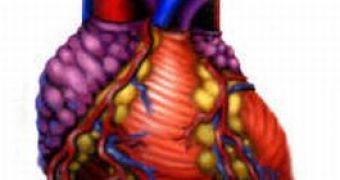A recent study carried out by a team of researchers at the Brigham and Women's Hospital in Boston found that B vitamins do not protect our heart and are rather inefficient when it comes to easing symptoms of cardiovascular disease. According to the results of the US-based Women's Antioxidant and Folic Acid Cardiovascular Study (WAFACS), taking supplements of B vitamins on a regular basis did not help women fight cardiovascular disease.
However, researchers pointed out that the study has only been conducted on women who either were already cardiovascular disease patients or had an increased risk of developing the fearful condition, as they presented 3 or more risk factors, such as smoking, diabetes, high blood pressure, high 'bad' cholesterol levels etc.
Lead author of the study Christine Albert from Brigham and Women's Hospital in Boston stated: "Our study does not suggest that taking folic acid, B6 or B12 primarily to prevent cardiovascular disease (CVD) would be worthwhile. Women who are taking them solely for that purpose may want to discontinue."
But if B vitamins were not found to be effective in improving cardiovascular disease symptoms, this does not mean that people should get the wrong idea that taking B vitamins supplements is worthless and does not help in preserving our general health or preventing other conditions.
Representants of the US trade organization The Council for Responsible Nutrition (CRN) cautioned: "It would be a public health disservice if the results of this study were misinterpreted in a manner which discouraged women of childbearing age from heeding the recommendations of the Institute of Medicine and the Centers for Disease Control to supplement their diet with folic acid."
Previous researches showed that vitamin B6, for instance, helps to the formation of red blood-cells and is a powerful antioxidant, as well as all other vitamins, in fact. It contributes to the good functioning of the brain and nervous coordination, to the emotional balance, encourages antibodies forming and increases the immunity to infections.
Besides taking B vitamins supplements, people independent of age, race etc. may also consider taking the complex of vitamins from natural resources, such as beef or veal liver (100 mg), which covers almost a half of the daily required amount of B6. B vitamins can also be found in brains, pork, chicken, whole cereals (brown rice), eggs, olives, apples, pears, plums, blueberries, chestnuts, strawberries, quinces, pomelos, lemons, potatoes, soy beans, bananas, nuts, cabbage, celery, spinach, parsley, beans, sardines.
Dr Annette Dickinson, consultant and ex-president of the CRN concluded: "It is unrealistic to expect vitamins to undo damage caused by heart disease, nor should consumers look to B vitamins to treat disease. The real question should be whether a healthy lifestyle - eating fruits and vegetables, getting exercise, regular physician visits, and consistent use of vitamin supplements - could have prevented these women from getting heart disease in the first place. "

 14 DAY TRIAL //
14 DAY TRIAL //